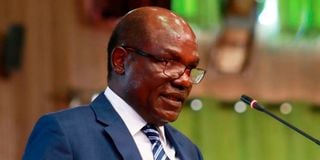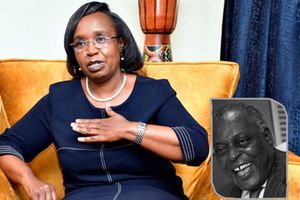Premium
IEBC impotent in punishing early campaigners

Wafula Chebukati, the chairman of the Independent Electoral and Boundaries Commission (IEBC).
The electoral agency’s failure to rein in 2022 election aspirants who have kicked off early campaigns has raised doubts about its ability to enforce the law.
Even though the Independent Electoral and Boundaries Commission (IEBC) has immense powers to regulate the conduct of the elections, it has repeatedly failed to do so.
As a result, aspirants for political offices have taken the cue and are no longer scared of IEBC’s threats.
With the elections eight months away, Deputy President William Ruto and ODM leader Raila Odinga have already hit the campaign trail as they seek to succeed President Uhuru Kenyatta.
Despite the obvious violations of law and concerns raised by other aspirants, IEBC appears unable to tame the two and others engaging in early campaigns, choosing instead to express its displeasure through lame press releases.
IEBC boss Wafula Chebukati has warned that early campaigns, some of which have turned violent, could upset the political environment in the lead-up to the polls.
2022 polls
Yesterday, IEBC met with NCCK on election preparedness and Mr Chebukati reiterated his position that the official start of campaigns for the 2022 polls was yet to be published. He warned that the ongoing campaign drives, including the erection of posters, are tantamount to breaking the Elections Act.
“It is punishable under the Election Offences Act,” he told the clerics, without saying whether IEBC would take action against offenders.
Besides, early campaigns, conducting fundraisers and political violence are considered punishable election offences.
However, there is a challenge. Parliament rejected regulations that would have put into effect the Campaign Financing Act, accusing IEBC of submitting the rules to the House too late.
The Act would have capped the amount of money candidates could spend in campaigns, and without the regulations it could not be implemented.
IEBC has neither the power nor the capacity to enforce election-related offences and must rely on other state agencies to achieve this goal, argued University of Nairobi scholar Dr Wamuti Ndegwa.
“Most of the election offences like bribery and violence can only be enforced by other state agencies,” Dr Ndegwa said.
Public pressure
He cited those agencies as the Registrar of Political Parties, the office of Director of Public Prosecutions, the Ethics and Anti-Corruption Commission, the Directorate of Criminal Investigations, the courts and the Ministry of Interior.
Even with such reliance on other agencies, IEBC bowed to public pressure and walked out of a multi-agency team that is working on 2022 election preparations and is chaired by Chief Justice Martha Koome.
Mr Chebukati explained that IEBC is not subject to direction or control by any person or authority.
But Dr Ndegwa rejects the reasoning, pointing out that IEBC cannot work in isolation as it must depend on other agencies to enforce sanctions arising from election offences.
“There are some election irregularities that can only be enforced by the security apparatus of the state,” he added.
Even for minor irregularities, IEBC depends on or must be notified by other stakeholders.
Nominated MP Godfrey Osotsi says that while he understands the concerns raised about early campaigns, he is sympathetic to IEBC’s unique position, arguing that it is not culpable as there is no specific law preventing any individual from engaging in early campaigning.
General Election
Under the law, IEBC is supposed to regulate campaigns once the election period starts, as outlined in the Elections Operations Plan.
The campaign period starts with the publication of a notice about a General Election in the Kenya Gazette.
The Election Offences Act and the Electoral Code of Conduct are only enforceable within the gazetted time, which means that IEBC’s mandate is limited to the period between the start and the end of campaigns.
“Maybe it is time the commission should make robust proposals on how individuals who engage in election campaigns outside the mandatory campaign period should be dealt with,” Mr Osotsi said.
“In the absence of the law, we are only left with morals to address some of these issues, and as you know Kenyans are not good in morality.”
Nominated Senator Isaac Mwaura says IEBC has the powers to execute its mandate but is weakened by forces that want to control the outcome of elections.





